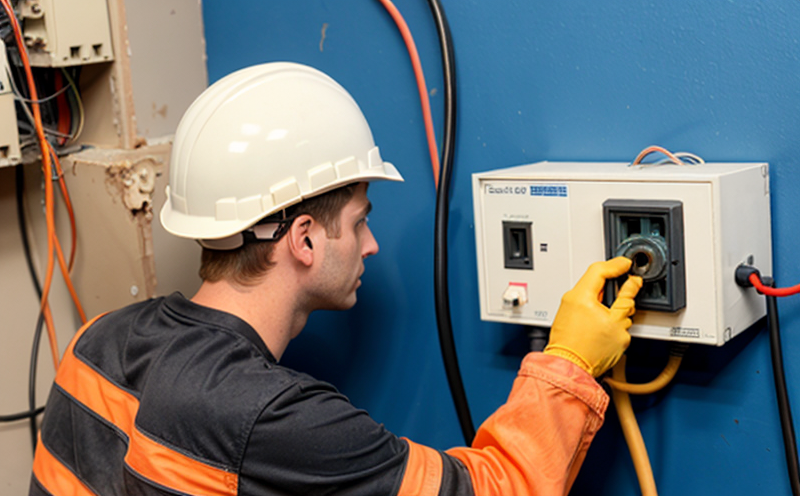IEC 60601-1 Isolation Resistance Testing
The IEC 60601-1 standard is a cornerstone of medical device safety, setting forth essential requirements to ensure the safe use of electrical and electronic medical devices. One critical aspect of this standard is isolation resistance testing, which evaluates the effectiveness of insulation between different conductive parts within the equipment. This test aims to confirm that any faults or malfunctions do not compromise patient safety by allowing unwanted currents to flow.
The primary focus of IEC 60601-1 is on electrical safety and protection against harmful effects, such as electric shock and fire hazards. Isolation resistance testing specifically targets the insulation between different conductive parts of a medical device. The test aims to ensure that under normal operating conditions, there is sufficient insulation resistance to prevent hazardous currents from flowing.
The standard defines isolation resistance as "the electrical resistance offered by the insulating material between two electrically live circuits or parts." It specifies that this resistance must be capable of withstanding a specified voltage for a set duration without breakdown. The test typically involves applying a high-voltage direct current (HVDC) across the insulation and measuring the resulting current, which is inversely proportional to the insulation resistance.
The testing procedure begins with careful preparation of the specimen. This includes ensuring that all non-test components are properly isolated or grounded to prevent interference with the test results. The specimen must be clean and free from any foreign substances that could affect the accuracy of the measurement. The test voltage is gradually increased until it reaches the specified value, often 1000 V DC for Class I devices.
The specimen is then held at this voltage for a minimum duration as defined by the standard—typically one minute for most applications. During this time, the current flowing through the insulation is measured and recorded. If the measured resistance exceeds the specified threshold value (which can vary depending on the device class), the test is considered passed. For Class II devices, the isolation resistance must be at least 10 MΩ, while for Class I devices with reinforced insulation, it should be no less than 2 MΩ.
The results of this testing are crucial in ensuring that medical devices meet stringent safety requirements before they reach the market or healthcare facilities. Compliance with these standards not only protects patients but also enhances public confidence in the reliability and safety of medical equipment. Moreover, adherence to IEC 60601-1 helps manufacturers avoid potential legal issues and costly recalls.
In summary, IEC 60601-1 is a comprehensive standard that sets out essential requirements for electrical safety in medical devices. Isolation resistance testing plays a vital role in confirming the adequacy of insulation between conductive parts, thereby safeguarding against potentially dangerous situations such as electric shock or fire.
Benefits
- Enhanced Patient Safety: Ensures that devices do not provide a pathway for harmful currents to flow, reducing the risk of electrical accidents.
- Avoidance of Recall Costs: Compliance with IEC 60601-1 standards minimizes the likelihood of product recalls and associated legal risks.
- Market Access: Meeting these stringent safety requirements facilitates easier market entry in countries adhering to global medical device regulations.
- Increased Consumer Confidence: Demonstrates a commitment to high-quality products, thereby boosting brand reputation and customer trust.
- Regulatory Compliance: Ensures that your product meets the stringent safety requirements set by regulatory bodies worldwide.
- Improved Quality Assurance: Provides detailed data on insulation performance, enabling continuous improvement in design and manufacturing processes.
Eurolab Advantages
Eurolab is renowned for its expertise in medical device testing, offering a comprehensive suite of services tailored to meet the unique needs of this sector. Our team of highly qualified engineers and technicians ensures that every test conducted adheres strictly to international standards such as IEC 60601-1.
We employ state-of-the-art equipment capable of performing precise measurements down to nanovolts, ensuring accurate results even in the most challenging scenarios. Our laboratories are equipped with facilities designed specifically for testing medical devices, including specialized chambers and controlled environments that simulate real-world conditions.
Our commitment to quality extends beyond just technical capabilities; we also prioritize customer satisfaction by providing clear communication throughout the testing process. From initial consultation through final report delivery, our goal is to ensure a seamless experience from start to finish.
In addition to our robust infrastructure and experienced personnel, Eurolab offers flexibility in scheduling tests according to your project timeline. Whether you need quick turnaround times for urgent projects or longer periods dedicated to thorough inspections, we can accommodate all requirements efficiently.
By choosing Eurolab for your IEC 60601-1 isolation resistance testing needs, you gain access to a wealth of knowledge and experience in medical device safety. Our dedication to excellence has made us one of the leading laboratories in this field, trusted by both established brands and startups alike.





